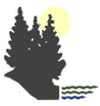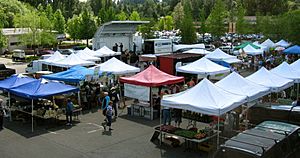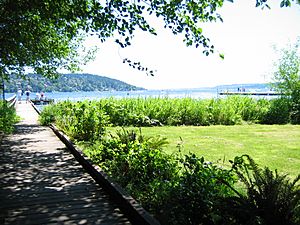Lake Forest Park, Washington facts for kids
Quick facts for kids
Lake Forest Park, Washington
|
||
|---|---|---|
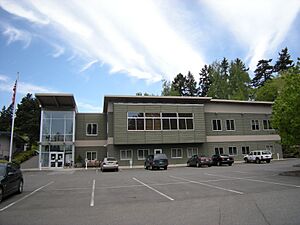
City hall
|
||
|
||
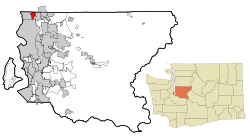
Location of Lake Forest Park in
King County and Washington |
||
| Country | United States | |
| State | Washington | |
| County | King | |
| Incorporated | 1961 | |
| Government | ||
| • Type | Mayor–council | |
| Area | ||
| • Total | 4.15 sq mi (10.74 km2) | |
| • Land | 3.52 sq mi (9.11 km2) | |
| • Water | 0.63 sq mi (1.63 km2) | |
| Elevation | 69 ft (21 m) | |
| Population
(2020)
|
||
| • Total | 13,630 | |
| • Density | 3,839.64/sq mi (1,482.51/km2) | |
| Time zone | UTC-8 (PST) | |
| • Summer (DST) | UTC-7 (PDT) | |
| ZIP code |
98155
|
|
| Area code(s) | 206 | |
| FIPS code | 53-37270 | |
| GNIS feature ID | 1512366 | |
Lake Forest Park is a city in King County, Washington, USA. It's located just northeast of Seattle. This city was designed in the 1900s as a "bedroom community." This means it's mostly a place where people live in houses and then travel to nearby cities for work. Most of the land here is for single-family homes, and there are very few commercial or industrial areas.
The city sits at the northwest end of Lake Washington. State Route 522 runs through it, connecting Lake Forest Park to Seattle and Bothell. The city has several parks, nature spots, and access to the Burke–Gilman Trail. It also hosts fun summer events. In 2020, about 13,630 people lived in Lake Forest Park.
Contents
History of Lake Forest Park
Lake Forest Park was started in 1912 by Ole Hanson. It was one of the first "planned communities" in the Seattle area. The idea was to create a beautiful, quiet place for professionals to live. When they planned the roads and building lots, they made sure to protect the natural features.
The original sales brochure for the land said:
…all the natural beauty must be preserved; that no tree must unwittingly be cut down; that the natural wild flowers must remain; that the streams, the springs, the lake front, the nodding willows, the stately cedar, the majestic fir, the quivering cypress and the homelike maple and all the flora and fauna with which Nature has blessed this lakeshore, must not be defiled by the hand of man.
This means they wanted to keep the area as natural and beautiful as possible. They didn't want people to cut down trees or harm the plants and animals.
Until 1914, the "Red Brick Road" (now part of State Route 522) ended here. This road connected Lake Forest Park to nearby Kenmore and Bothell. Before this road was finished, the best way to travel further north or east was by boat across Lake Washington or by train.
Lake Forest Park officially became a city on June 20, 1961. This was mainly to help the community keep its unique identity. The city stayed small, with fewer than 5,000 people, until the 1990s. Then, the city grew a lot by adding nearby areas, which more than doubled its population.
In the late 1990s, Lyon Creek Park was created. The city bought the land in 1998. Before that, it was a private property with a house and horse stable. These buildings were removed, and 5,000 native plants were planted. Hundreds of volunteers helped with this project.
The Lake Forest Park Town Center is the main shopping and community area. It was built in 1964 near the lake. In 2005, the city decided to update the Town Center. Today, it covers 18 acres and has many shops, restaurants, and entertainment options. It also has a branch of the King County Library System, a bookstore called Third Place Books, and a community center called Third Place Commons.
Geography of Lake Forest Park
Lake Forest Park is located at the northern end of Lake Washington. To the south, it borders Seattle. To the north, it reaches the Snohomish County line, where Mountlake Terrace and Brier are located. To the east, it's bordered by Lake Washington and the city of Kenmore. The Burke-Gilman Trail runs along the lake, going into Kenmore to the north and Seattle to the south. The western border is with the City of Shoreline.
The city covers about 3.65 square miles (9.45 square kilometers). Most of this is land (3.53 sq mi or 9.14 sq km), and a small part is water (0.12 sq mi or 0.31 sq km). The two biggest streams are Lyon Creek and McAleer Creek. These creeks are important because they provide a home for salmon. The shoreline has two private beach clubs, but no public boat access to Lake Washington. However, Lyon Creek Waterfront Preserve offers 100 feet of Lake Washington shoreline and a dock for viewing the lake.
Parks in Lake Forest Park
Lake Forest Park has several great parks for everyone to enjoy:
- Horizon View Park is the highest point in Lake Forest Park. It has fields, a playground with swings and a play train, a basketball half-court, a tennis court, picnic tables, and paved paths through a wooded area. This park is 8.4 acres and is located at 19800 47th Ave NE.
- Pfingst Animal Acres Park is at NE 178th St and Brookside Blvd. It features picnic tables, a quarter-mile walking loop, and a special platform to watch salmon. There's even a drinking fountain shaped like a dogwood flower for both people and dogs! The park also has a statue of Admiral Miguel Grau Seminario, given to the city by Peru in 2011.
- Grace Cole Nature Park is a 15.2-acre wetland named after State Representative Grace Cole. It's located at 30th Ave NE at NE 166th St. The Lake Forest Park Stewardship Foundation often organizes "ivy out" events here to help protect the wildlife habitat.
- Lyon Creek Waterfront Preserve is across the street from the Lake Forest Park Town Center at 17337 Beach Drive NE. It has a short trail and boardwalk where you can see where Lyon Creek flows into Lake Washington. This park includes 100 feet of Lake Washington shoreline.
- Whispering Willow Park is found at 17038 44th Ave NE. This park has a short boardwalk, seating, and a natural play area for kids. It connects 44th Ave NE with the Lake Forest Park Town Center.
Neighborhoods in Lake Forest Park
The Lake Forest Park Town Center is the main business area of the city. This one complex includes the public library, the police department, city hall, and about 40 shops, small businesses, and offices. Third Place Commons is a large public space on the upper level of the main building. In the summer, this same complex hosts a large outdoor farmers' market.
Here are some of the residential neighborhoods:
- Horizon View is in the northeast part of the city. It's known for being close to Horizon View Park, which is the highest point in Lake Forest Park. The park sits on a small flat area, reached by several steep hills. Half of the park is a play area, and the other half is a water reservoir.
- Sheridan Beach/Heights is in the southeast part of the city. Residents here can pay a fee to use the Sheridan Beach Club, which is nearby.
Population and People
| Historical population | |||
|---|---|---|---|
| Census | Pop. | %± | |
| 1970 | 2,530 | — | |
| 1980 | 2,485 | −1.8% | |
| 1990 | 4,031 | 62.2% | |
| 2000 | 13,142 | 226.0% | |
| 2010 | 12,598 | −4.1% | |
| 2020 | 13,630 | 8.2% | |
| 2021 (est.) | 13,358 | 6.0% | |
| U.S. Decennial Census 2018 Estimate |
|||
Lake Forest Park is considered one of the wealthier areas in Washington state. This is based on its "per capita income," which means the average amount of money earned per person.
2010 Census Information
According to the 2010 census, there were 12,598 people living in Lake Forest Park.
- About 83% of the people were White.
- About 8.8% were Asian.
- About 1.8% were African American.
- About 3.6% of the population was Hispanic or Latino.
- The average age in the city was 45 years old.
- About 20.8% of residents were under 18 years old.
- About 15.1% were 65 years or older.
Famous People from Lake Forest Park
- Octavia Butler, a famous science fiction writer
- Adam Ray, a comedian and actor
- Rainn Wilson, an actor and author
- DeAndre Yedlin, a professional soccer player
- Michelle Akers, a professional soccer player
Education in Lake Forest Park
Lake Forest Park has a highly educated population. Based on the 2000 census:
- Over half (51.1%) of adults over 25 years old have a bachelor's degree or higher. This is much higher than the national average of 24%.
- Most adults (93.2%) have a high school diploma or equivalent.
The city is part of the Shoreline School District. There are two public elementary schools in Lake Forest Park: Brookside Elementary and Lake Forest Park Elementary.
See also
 In Spanish: Lake Forest Park para niños
In Spanish: Lake Forest Park para niños
 | Madam C. J. Walker |
 | Janet Emerson Bashen |
 | Annie Turnbo Malone |
 | Maggie L. Walker |


